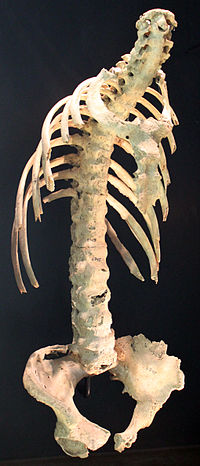
Photo from wikipedia
Spondyloarthritis (SpA) patients suffer from joint inflammation resulting in tissue damage, characterized by the presence of numerous neutrophils in the synovium and synovial fluid (SF). As it is yet unclear… Click to show full abstract
Spondyloarthritis (SpA) patients suffer from joint inflammation resulting in tissue damage, characterized by the presence of numerous neutrophils in the synovium and synovial fluid (SF). As it is yet unclear to what extent neutrophils contribute to the pathogenesis of SpA, we set out to study SF neutrophils in more detail. We analyzed the functionality of SF neutrophils of 20 SpA patients and 7 disease controls, determining ROS production and degranulation in response to various stimuli. In addition, the effect of SF on neutrophil function was determined. Surprisingly, our data show that SF neutrophils in SpA patients have an inactive phenotype, despite the presence of many neutrophil-activating stimuli such as GM-CSF and TNF in SF. This was not due to exhaustion as SF neutrophils readily responded to stimulation. Therefore, this finding suggests that one or more inhibitors of neutrophil activation may be present in SF. Indeed, when blood neutrophils from healthy donors were activated in the presence of increasing concentrations of SF from SpA patients, degranulation and ROS production were dose-dependently inhibited. This effect was independent of diagnosis, gender, age, and medication in the patients from which the SF was isolated. Treatment of SF with the enzyme hyaluronidase strongly reduced the inhibitory effect of SF on neutrophil activation, indicating that hyaluronic acid that is present in SF may be an important factor in preventing SF neutrophil activation. This finding provides novel insights into the role of soluble factors in SF regulating neutrophil function and may lead to the development of novel therapeutics targeting neutrophil activation via hyaluronic acid or associated pathways.
Journal Title: International Journal of Molecular Sciences
Year Published: 2023
Link to full text (if available)
Share on Social Media: Sign Up to like & get
recommendations!